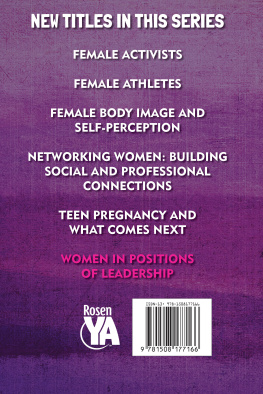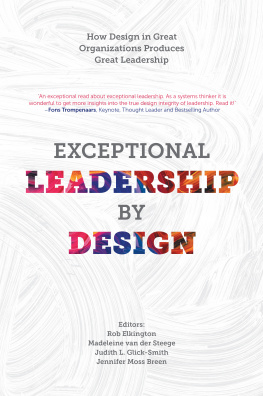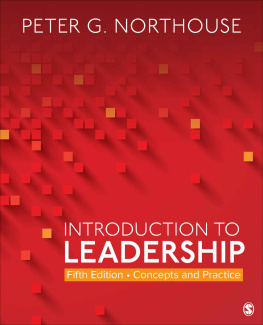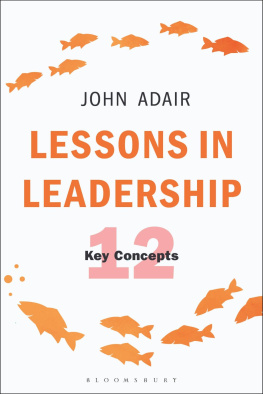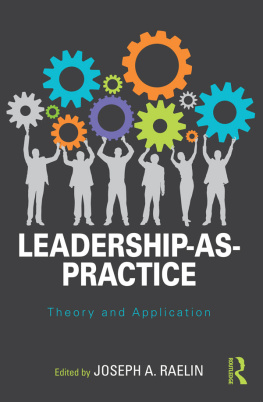Acknowledgements
This book has been developed with the help of many others. We would both like to thank the women leaders we interviewed for their time and their continued interest in our project. Their inspirational stories and optimism have encouraged us hugely in bringing this book to its fruition.
Valerie would like to thank her family for their support Crispin, Sarah and Tom have kept me motivated throughout, and thanks to Dad for his encouragement. Carole would like to thank Tony for his encouragement and support, and Mum and Dad for their optimism in my ability to complete this project. We would both also like to give special thanks to colleagues Dr Caroline Gatrell, Dr Ellie Hamilton and Dr Elaine Swan for their continued support, friendship, reading of drafts and invaluable critical comments.
We would like to acknowledge the Northern Leadership Academy who provided funding for three of the women leaders interviews.
This book has been informed by earlier versions of our work which appear elsewhere as follows:
Elliott, C. and Stead, V. (2008) Learning from Leading Womens Experience: Towards a Sociological Understanding, Leadership Vol. 4 (2): 15980.
1
Common Understandings: Leadership and Leadership Development
Introduction
In this chapter we have two main aims. First, we aim to highlight the limited empirical base upon which our understanding of womens leadership is formed, particularly how they become leading women. Second, we aim to show how conceptions of leadership and leadership development are defined from a relatively narrow research base. This chapter seeks to meet these aims by providing an overview of the major trends in leadership and leadership development research.
The lack of empirical research into womens leadership, combined with the leadership literatures tendency to draw largely on studies of male leaders in traditional organisational structures, such as business organisations and the military (e.g. work by Grint, 2005a) serves, we claim, to perpetuate an implicit understanding of leadership as a male activity that is conducted in hierarchical institutions.
Emerging from this limited empirical base is a predominantly individualistic understanding of leadership which overestimates the power and influence of the individual leader. As a result, the significance of his/her relationship with the social and organisational environment, including the role of followers, is diminished (Grint, 2005a; Kuchinke, 2005). A lack of attention to the social and organisational environment then ignores important power relations, for example, how individuals achieve leadership roles and how leaders gain organisational influence. In the management and business studies field (Sinclair and Wilson, 2002) therefore, leadership research reinforces a conception of leadership as a phenomenon that is separate from organisational values and beliefs. Standing in contrast to this view however, are a growing number of critical studies that recognise the role that values and beliefs play in shaping dominant narratives regarding the relationship between leadership and power (e.g. Ashcraft and Mumby, 2004; Ford et al., 2008; Kempster, 2009). These qualitative engagements with leadership and leadership development practice present deeper understandings of the becoming of leaders, shedding light on how leaders learn leadership and how leadership identities are shaped.
Disappointingly however, the tendency to separate individual leaders from their sociocultural contexts in leadership research is mirrored in the majority of government-sponsored surveys, reports and media profiles of successful women as referred to in our Introduction and in later chapters. This contemporary media and academic interest in publicly recognised women, or women located in work organisations, does draw attention to both their and societys attempts to understand what motivates and hinders womens success. This attention is in part symptomatic of the increasingly prominent role played by women in public life, yet simultaneously indicative of the inequalities between womens and mens pay levels and the low number of women in leadership positions, as traditionally defined. Nevertheless the lack of detailed consideration given by such surveys and profiles to the broader sociocultural structures within which women live and work limits our ability to learn how women either become successful, or alternatively, why they fail to achieve their ambitions.
We begin this chapter by examining the dominant themes in leadership literature, in particular the shift from the conception of leadership as an activity practised by individuals towards understandings that consider it to be more a process located in social activity. We then go on to explore postheroic models of leadership that position leadership as a shared and social practice. As we observe however, these understandings are remarkable for their lack of attention to womens leadership and to the significance of gender in shaping possibilities for leadership practice. We then discuss how conceptions of leadership development reflect understandings of leadership. They too therefore, largely ignore womens experiences and so gender remains an invisible influence in the leadership learning process. We then discuss how this lack of attention to women, and to gender, compromises postheroic understandings of leadership and leadership development. We conclude this chapter by asking:
- how are we to understand womens leadership?
- how are we to find alternative conceptions of leadership?
- where do we find alternatives to leadership development that include women leaders experiences?
Dominant stories in leadership
As many writers on leadership have noted before us (e.g. Grint, 2000), the volume of leadership literature addressing the question, what is leadership? is immense. It is not our intention here to review the history of leadership theory. This has already been undertaken by authors such as Bass (1990), Daft (1999), Northouse (2004), van Maurik (2001) and Yukl (2008). Rather, our interest is to study the theoretical assumptions that underpin dominant understandings of leadership. This exploration is empirically and theoretically informed. Empirically, our understanding has been influenced by our direct engagement with leading womens accounts of their experience, and indirectly through our engagement with women leaders stories in a range of academic, practitioner and media publications. Theoretically, our approach is informed by poststructural understandings of leadership and organisation, which argue that reading, writing and talking are not innocent activities, but are actively productive (Ford et al., 2008: 10). As such, we argue that to develop a deeper understanding of leadership we need to go beyond discrete organisational sites, to other locations and texts where leadership is practised and discussed. Working within this approach sensitises us to the ways in which dominant narratives of leadership find life in certain texts such as film, literature and academic studies (Ashcraft and Mumby, 2004). From this perspective, understanding leadership becomes in part a process of engaging with the ways in which individuals consume, draw upon and resist leadership representations.
Taking this approach to our study of womens leadership experiences has made us aware of certain trends and themes in leadership research. One is the dominance of the positivist epistemological position which has led many researchers to pursue a definition of leadership that can be universally applied. Researchers attempts to prove or falsify what leadership is, has led to a focus on identifying attributes and behavioural traits associated with effective leaders. In recent years however, criticisms of this perspective have come from researchers taking a social constructionist stance, who argue that positivist perspectives on leadership are both reductionist and non-developmental (Alvesson, 1996). They advocate a move away from the search for generic individual attributes to approaches that consider leadership from a more systemic, relational perspective (Kempster, 2009).




